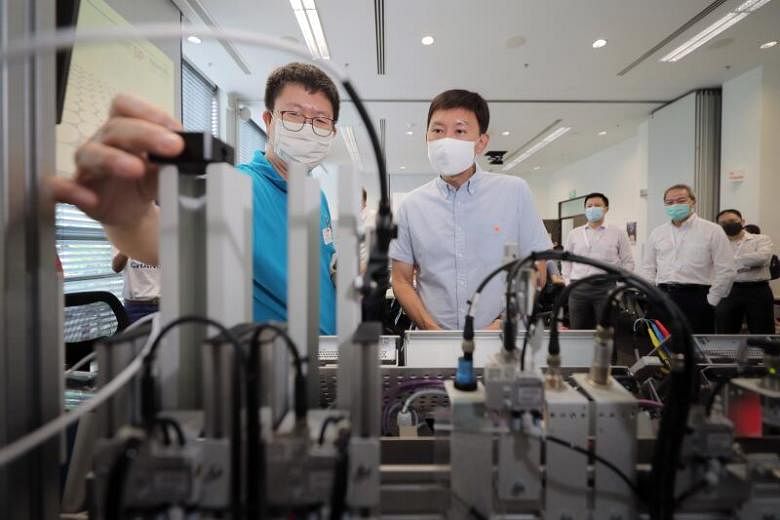SINGAPORE - Manufacturing firms and workers will get more help in preparing for the factory of the future, with a new programme developed by German giant Bosch, which aims to train about 1,500 workers and support 300 companies in the next five years.
Its Industry 4.0 training programme was launched here on Wednesday (July 22), through the Bosch Rexroth Regional Training Centre.
The conglomerate is working with Singapore Polytechnic to produce bite-sized modules to help manufacturers to transform.
In addition, a longer specialist course will be rolled out in the first quarter of next year, in partnership with the Singaporean-German Chamber of Industry and Commerce.
This will include five modules, totalling more than 104 hours, covering such areas as business models in production and logistics, as well as technology related to cyber physical systems.
Companies can also carry out proof-of-concept projects, in which they bring a problem statement to the training session and apply the technologies they learn to find solutions.
Senior Minister of State for Trade and Industry Chee Hong Tat said on a visit to Bosch on Wednesday that in the next stage of SkillsFuture, the enterprise pillar will be very crucial, "because we need to work closely with our industry partners to develop stronger capabilities and deepen the skills of our workforce".
This close partnership will also help "to tailor some of the programmes to better fit what the companies will look for subsequently when they generate jobs and look for growth opportunities", he added.
He also said that one way to spur training and transformation is to collaborate with "queen bee" companies like Bosch Rexroth, a Bosch subsidiary that provides industry solutions.
"Many of the small and medium-sized enterprises (SMEs) are too small to have the resources and scale to develop the training programmes."
There are now 17 queen bee companies, which are industry leaders identified by SkillsFuture. They include local companies such as United Overseas Bank and energy company SP Group. The goal is to have 40 such companies in the next five years, he said.
The first training session was conducted at Bosch South-east Asia headquarters, sited in Bishan. Subsequent sessions will be held at Singapore Polytechnic until the Bosch Rexroth Regional Training Centre, at Jurong Innovation District, is ready early next year.
The move to transform companies will help to grow Singapore's manufacturing capabilities, especially since it is unable to compete on cost, Mr Chee noted.
"But that doesn't mean we cannot do well in manufacturing. It is about what kind of manufacturing and how we organise ourselves, how we establish the networks with the supply chains and the value chains in the region. And (most) importantly, it is how we use technology and design to help us become more productive and more competitive."
By working with Bosch, Singapore can tap on its deep expertise here and in its global networks - and this will be very valuable to grow the capabilities of "our SMEs and workers", he added.
Mr Roland Keller, president of Bosch Rexroth in Asean and Oceania, added that while there is much talk about Industry 4.0, there continues to be little traction. Training can generate this push and drive the adoption of advanced manufacturing.
"The new Industry 4.0 specialist qualification opens up new job opportunities, competencies, and attractiveness which further solidifies Singapore's competitive edge as a strong manufacturing base and preferred investment destination in the region," he said.
One trainee at the Bosch class is Mr Goh Chye Lim, who was last employed as a mechatronics and robotics engineer.
Said the 53-year-old: "In these times of crisis, the expectations of employers are more demanding. I noticed, after a few failed interviews, that I have knowledge gaps in software and technology and I need to close the gaps."
He said he had not only learnt software skills and programming but also received hands-on training in concepts like the Internet of Things.


